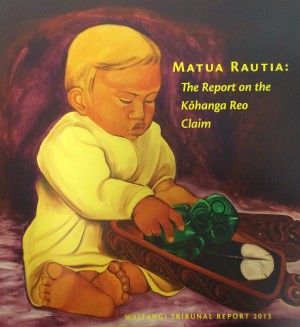Wai 2336: Matua Rautia: Report on the Kōhanga Reo Claim

The Waitangi Tribunal has today (18 October 2012) released a pre-publication version of Matua Rautia: Report on the Kōhanga Reo Claim, its report into the kōhanga reo claim filed by the Te Kōhanga Reo National Trust.
The Tribunal heard the claim under urgency during March and April 2012, with Deputy Chief Judge Caren Fox presiding. Other members of the Tribunal panel were former Minister and Speaker the Honourable Sir Douglas Kidd, Kihi Ngatai QSM, Ron Crosby, and Tania Simpson.
The urgent inquiry was triggered by the publication in 2011 of the report of the Early Childhood Education Taskforce. The claimants said that the taskforce had not consulted with them, that the report had seriously damaged their reputation, and that the report, and Government policy based on it, would cause irreparable harm to the kōhanga reo movement.
The claimants also raised wide-ranging allegations of Treaty breach concerning the Crown's treatment of kōhanga reo over the past two decades. In particular, they said, the Crown had effectively assimilated the kōhanga reo movement into its early childhood education regime under the Ministry of Education, stifling its vital role in saving and promoting the Māori language and leading to a long decline in the number of Māori children participating in early childhood immersion in te reo me ngā tikanga Māori.
The Tribunal found that the Crown's early childhood education system, in particular its funding formula, quality measures, and regulatory regime, had failed to adequately sustain the specific needs of kōhanga reo as an environment for language transmission and whānau development. These failures constituted breaches of the Treaty principles of partnership and equity.
The Crown, the Tribunal said, had failed to fulfil the partnership agreement it entered into in 2003 with the Te Kōhanga Reo National Trust. An already difficult relationship between the Crown and the trust, with frustrations on both sides, had worsened following the Crown's failure to consult the trust on the taskforce's report, as required in good faith under the partnership agreement.
The Tribunal expressed its deep concern at the vulnerable state of te reo Māori, to which, as a taonga, the Crown had a duty of active protection that it had failed to meet. It accepted the expert evidence that early childhood immersion was an effective means of transmitting te reo me ngā tikanga Māori to the next generation. Kōhanga reo, represented by the trust as kaitiaki, were, the Tribunal considered, essential to the survival and revitalisation of te reo Māori.
The Tribunal concluded that significant prejudice to the claimants had occurred as a result of the Crown's breaches of Treaty principles. It considered that as a result the claimants had suffered, and were likely to continue to suffer, significant prejudice. The Tribunal accordingly adjudged the claim to be well founded.
The Tribunal called on the Crown to make a formal acknowledgement and apology for the Treaty breaches that had occurred. It recommended that the Crown appoint an interim independent adviser based in the Department of Prime Minister and Cabinet to redevelop the engagement between Government agencies and the trust and to ensure early progress on resolving outstanding issues. These issues included the funding regime for sustaining quality in language transmission; the regulatory and performance reviewing framework; research on the effectiveness and educational outcomes of the kōhanga reo model; and information for Māori whānau on the linguistic and educational benefits of early childhood te reo immersion.
The Tribunal also recommended that urgent attention be given to the need for additional capital funding to enable kōhanga reo to comply by the deadline of 2014 with the new early childhood regulations. As many as a third of kōhanga reo and more than 3,000 children were at risk of displacement.
The Tribunal endorsed the conclusion of the Wai 262 Tribunal's report, Ko Aotearoa Tēnei, that urgent steps were needed to address recent Crown policy failures if te reo were to survive. The Tribunal noted that survival requires both Treaty partners – Māori and the Crown – to collaborate in taking whatever reasonable steps are required to achieve the shared aim of assuring the long-term health of te reo as a taonga of Māori.
The final version of the report has replaced the pre-publication copy and is available to download in PDF format:
Matua Rautia: The Report on the Kōhanga Reo Claim [PDF, 4.3MB](external link)
For media inquiries, contact the Ministry of Justice media centre(external link)